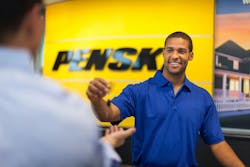This is Part 3 of a three-part story. Read Part 1 here. Read Part 2 here.
New and used trucks both have their pros and cons. But at least for the next few years, leasing might end up being the most attractive procurement strategy because it answers the most important question for overburdened fleet managers: “Can’t somebody else do it?”
In short, leasing takes the hassle out of running a fleet, especially if you do full service, which includes maintenance. Instead of paying off a loan, you pay a fixed amount to a bank or leasing company’s financial arm for an agreed-upon number of months. At the end of the term, you hand the keys back and can upgrade to the new model year, which will have the latest safety, efficiency, and driver comfort features. The lessor also can handles the minutia of truck ownership, such as licensing, fuel tax, and permits.
“Does your logistics department want to manage all of the truck maintenance, technician training, and capital expense of these ever-changing vehicles, or do you want more of a full-service lease with PacLease, with manufacture-trained technicians, where we can take care of everything?” asked Joe Vatalaro, VP of maintenance for PacLease adding account reps will also help with debt, capitalization, and overall finances.
This lets executives and owners of any fleet focus on their actual raison d’être, whether that’s hauling pebbles or delivering pharmaceuticals.
“What they really care about is what is the most cost-effective way that allows them to deliver their product from point A to point B that also provides the highest level of service to their customer base and gives them a competitive advantage in their market,” NationaLease President Dean Vicha said.
Lessors provide the scale and adaptability small fleets need to compete with larger competitors and have partnerships with maintenance providers who can service all makes and models.
For small fleet owners, like Christopher DeFeo, president of DeFeo Materials, this can prove helpful. “Without a doubt, the most difficult part of the industry is either going to be the repairs and maintenance or the rules and regulations,” he noted.
This will become even more important as the planning phase for the next wave of GHG Phase 3 regulations that emphasize zero-emission powertrains ramp up at the end of the decade.
“We’ve got people dedicated to this,” Jim Lager, EVP of sales and rental at Penske Truck Leasing, said of handling regulations. “This is their job. They do nothing but meet with regulators or meet with manufacturers to dive into the maintenance aspect.”
Another difference is with leasing, you just re-up a new lease or walk away. Ownership, though, allows fleets to build equity and depreciate an asset’s value at tax time, which DeFeo noted would be more savings if profits were high. But that doesn’t always work out in a bad economy.
“Companies that have been selling equipment over the last few years have been getting kicked in the gut a lot because they’re upside down depending on how quickly they depreciated the asset,” said Hadley Benton, VP of business development for Fleet Advantage. “The faster you depreciated them the lower your loss, but still a loss.”
There’s also residual value to take into account, which is the value of a truck that has been completely depreciated. In leasing, fleets don’t have to worry about depreciation or residual value. The lessor assumes all that.
Benton advises spending on items that are “accretive to your bottom line.” DeFeo Materials, for example, is investing in a maintenance facility at the quarry so equipment can be worked on indoors. In cases like that, where capex is spoken for, leasing avoids dealing with complicated accounting. “I’m probably not going to put [capex] into a depreciating asset like a truck, so that has a big impact on whether I purchase it or whether I lease it,” he said.
Fleet Advantage offers an early exchange program without penalty and uses data analytics to predict when the best time to exchange is, factoring in things like fuel efficiency and maintenance costs.
That is helping fleets plan their prebuy strategy.
“Probably 50% of our asset base is already committed to early exchanges,” Benton said. “So what that means is for those terminations [set to expire] in ’27 and ’28, we’ve already started coaching those customers through replacements in ’25 and ’26.”
Lager said that based on mileage and utilization of the asset, customers can help extend past 2028 to “ride through the introduction of the new equipment.”
According to the latest benchmarking survey from the National Private Truck Council, 28% of private fleets in the Class 8 sector lease the majority of their fleet, while 38% own more than 90% of their fleet. About one in three does a combination of owning and leasing.
“We are seeing more market share moving to full-service leasing in the private fleet arena,” NationaLease’s Vicha noted. “As vehicles continue to become more complex and capital intensive, I expect this to continue.”
And in planning for the future, Fleet Advantage also just announced a new program that provides battery-electric trucks and yard tractors at essentially the same cost as diesel trucks, which could result in a $3,000 saving per month. The lessor absorbs those costs.
“By taking some financial risk, we think we can convince the early adopters to take on some operational risk and help move the needle on the transition to alternative fuels,” Benton said.
Questioning whether a fleet should lease or buy “is an exercise that all companies should be going through on a regular basis because there are lots of factors that go into that cost of funds,” Benton explained. He added it’s not uncommon for fleets to switch back and forth depending on the economy and fleet financial situation.
For DeFeo, a lease would protect against major repair costs, because the lessor handles maintenance, and the fleet would always have the latest, most efficient technology. Leasing also offers shorter terms than loans and accounting overall is simplified.
But on the con side, along with not building equity, fleets that require specialty equipment to do their jobs might have limited options and modifications might be prohibited. DeFeo’s trucks needs wetline PTOs, for example. Vatalaro said PacLease does work with fleets to customize Peterbilt and Kenworth trucks.
In the end, availability is what matters most. And according to a recent discussion with one OEM, Benton believes customers should make a decision by Q2 2025 “to ensure you have allocation for 2026 and 2027.”
About the Author

John Hitch
Editor-in-chief, Fleet Maintenance
John Hitch is the award-winning editor-in-chief of Fleet Maintenance, where his mission is to provide maintenance leaders and technicians with the the latest information on tools, strategies, and best practices to keep their fleets' commercial vehicles moving.
He is based out of Cleveland, Ohio, and has worked in the B2B journalism space for more than a decade. Hitch was previously senior editor for FleetOwner and before that was technology editor for IndustryWeek and and managing editor of New Equipment Digest.
Hitch graduated from Kent State University and was editor of the student magazine The Burr in 2009.
The former sonar technician served honorably aboard the fast-attack submarine USS Oklahoma City (SSN-723), where he participated in counter-drug ops, an under-ice expedition, and other missions he's not allowed to talk about for several more decades.
